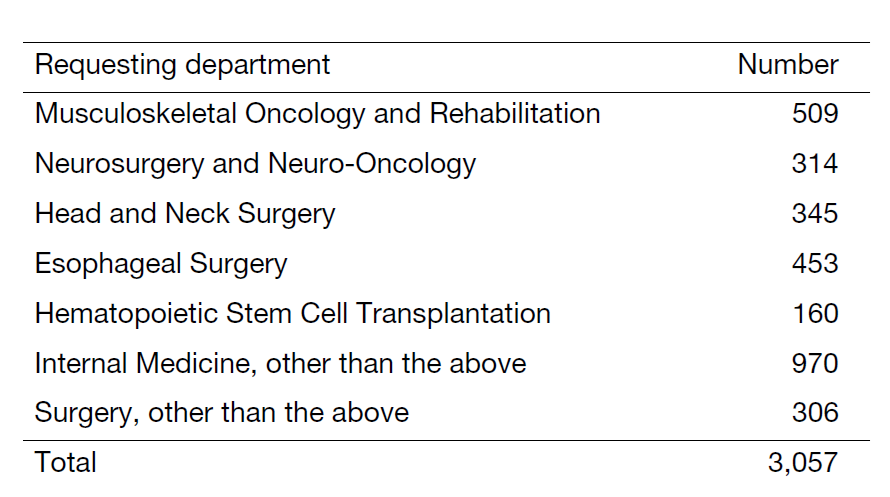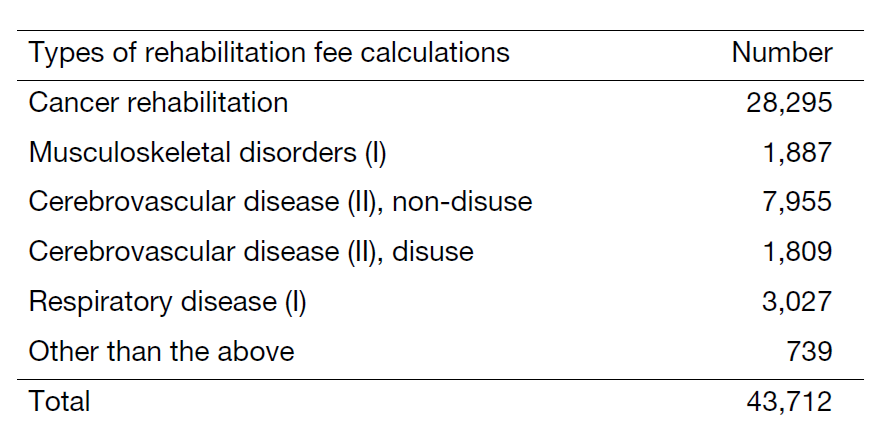Annual Report 2023
Rehabilitation Unit
Shuhei Osaki, Noriko Watanabe, Takuro Sakurai, Aiko Matsuoka, Mami Oki, Yusuke Okita, Shota Yokota, Risa Abe, Kaneyuki Ichikawa, Tomonori Yamada, Chieko Tsuji, Yoko Mori, Fanhong Kong
Introduction
Rehabilitation services have been mainly handled by the Department of Musculoskeletal Oncology and Rehabilitation. However, recognizing the diverse range of diseases and clinical departments requiring rehabilitation services, the Rehabilitation Unit was established as a section among the common departments in June 2023 to provide more integrated rehabilitation services. The Rehabilitation Unit is staffed by 2 board-certified physiatrists, 6 physical therapists, 2 occupational therapists and 3 speech-language-hearing therapists. All members of the Rehabilitation Unit have completed the Cancer Rehabilitation Course. As a rehabilitation unit of a specialized oncology facility, we are actively providing cancer rehabilitation perioperatively, before and after chemotherapy and radiotherapy.
The Team and What We Do
In FY2023, the number of new rehabilitation prescriptions were 4,061, requested from 25 clinical departments (Table 1). Caner rehabilitation was the most common type of rehabilitation performed, accounting for 65% of the total (Table 2). We actively engaged in awake brain surgery in the Department of Neurosurgery and Neuro-Oncology, and early mobilization of patients admitted to the ICU. In addition, we participate in the nutrition support team (NST), adolescent and young adult (AYA) support team, pressure ulcer care team (PUT) and swallowing support team (SST). We are advancing team-based care through interprofessional collaboration.
Table 1. Number of requests by clinical departments.

Table 2. Details of rehabilitation fee calculation types.

Research Activities
We are examining the effectiveness of rehabilitation for cancer patients in the perioperative period and during chemotherapy in collaboration with clinical departments. We are developing an outpatient rehabilitation program for postoperative esophageal cancer patients. In the area of rehabilitation for rare cancers, we are analyzing the health-related quality of life of postoperative patients with malignant bone and soft tissue tumors and the prognosis of physical function by site of onset of disease. We are also monitoring changes in body composition over time during cancer treatment and examining the effects of rehabilitation. The research results were reported at the Cancer Rehabilitation Study Group and other meetings.
Education
The following certifications were obtained: one NST Specialist Therapist, one Specialist Occupational Therapist for Oncology, one Cognitive Occupational Therapist and one completion of clinical practice supervisor training program for physical therapist and occupational therapist. A team of five from our hospital participated in a cancer rehabilitation training program. We accepted six university students from five universities in Japan for clinical training. In addition, one occupational therapist from Taiwan was accepted for training.
Future Prospects
We aim to develop more effective rehabilitation programs for cancer patients undergoing surgery, chemotherapy or radiation therapy. As a rehabilitation unit in a specialized cancer facility, we provide appropriate and effective rehabilitation services tailored to the stage of each patient's cancer. In collaboration with other healthcare professionals, we work to restore patients' functions and abilities, supporting a smooth transition from outpatient to inpatient care, and ultimately, to a return to home and community life after discharge.
